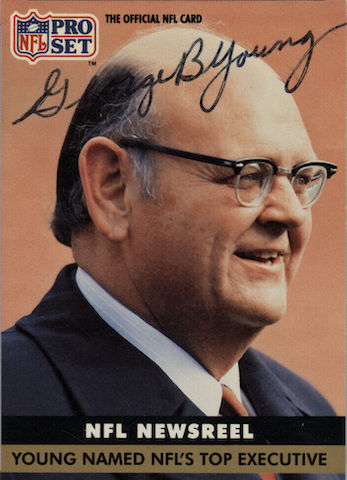
The NFL Giants played their first game as a New Jersey team when they moved into Giants Stadium in 1976. After opening the season with four road games, the team christened its new home on October 10, losing to the Cowboys on their way to a 3–11 season—their fourth in a row with a losing record. In 1978, the Giants made it six years in a row and hit a low point when they lost the infamous “Miracle in the Meadowlands” game to the Eagles. At that point, owner Wellington Mara decided it might be time for the family-owned-and-operated team to hire its first general manager. NFL Commissioner Pete Rozelle recommended George Young (right).
Young got to work rebuilding the club around quarterback Phil Simms, whom he drafted over the protest of fans in 1979. In 1981, rookie Lawrence Taylor led the club back to the playoffs for the first time in 18 years with an overtime win over Dallas on the final day of the season. In 1983, Bill Parcells was promoted from defensive coordinator to head coach. Over the next few years, Parcells blended veterans like Harry Carson and George Martin with rising stars Carl Banks, Leonard Marshall, Mark Collins and Pepper Martin to give the Giants one of the NFL’s top defensive units. Simms, meanwhile, had the weapons he needed in Mark Bavaro and Joe Morris to put points on the board. In 1986, the team went 14–2 and beat the 49ers and Redskins on the way to its first Super Bowl. Simms completed 22 of 25 passes in a 39–20 win over the Denver Broncos. It marked the franchise’s first championship since 1956.
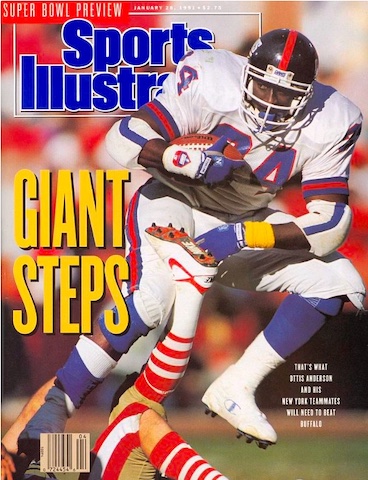
The Giants returned to the Super Bowl in 1990 following a 13–3 campaign. Jeff Hostetler filled in for Simms after a season-ending injury and led the team to playoff victories over the Bears and 49ers. The game with San Francisco was a violent defensive struggle that turned on a fourth-quarter fumble by Roger Craig. Matt Bahr kicked five field goals in a 15–13 win. Bahr then produced the winning points in the Super Bowl against the Buffalo Bills—a game decided on a missed kick by Scott Norwood. Ottis Anderson (left), with 102 yards and a touchdown, was named Super Bowl MVP.
A few months later, Parcells stepped down as coach. The Giants would go 10 years before making it back to the Super Bowl—and made just two playoff appearances in the intervening seasons. During this era, the team’s top players included Rodney Hampton, Robert Brooks, Chris Calloway and Michael Strahan. Strahan was the leader of the defense in 2000 when the Giants won the NFC Championship Game, 41–0, over the high-flying Minnesota Vikings. Their great season ended two weeks later when they were overwhelmed by the Baltimore Ravens in the big game, 34–7.
In 2004, Tom Coughlin replaced Jim Fassel as head coach and built the Giants around rookie passer Eli Manning and veteran running back Tiki Barber. Barber produced six 1,000-yard seasons in seven years and retired after the 2006 campaign, believing that Manning would be unable to produce a championship season. In 2007, Eli led the Giants to the Super Bowl, where they upset the New England Patriots, 17–14. Four years later, Manning produced another Super Bowl win over the Patriots, 21-17, highlighted by the famous fourth-quarter “Helmet Catch” by little-used wideout David Tyree. Manning was named MVP in both Super Bowls. As always, the team depended on its defense and special teams to keep games close.
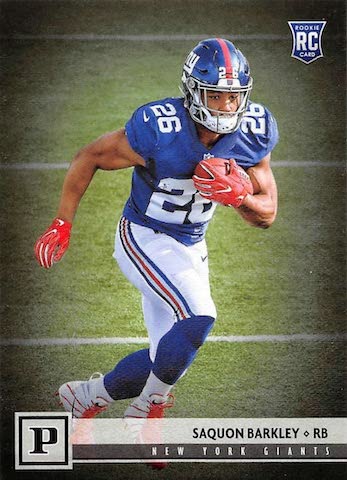
With the durable Manning continuing to hold down the quarterback position, the Giants had a couple more winning seasons, but lost more often than they won over the next seven years. Often, pass protection was the issue. Despite the emergence of young superstars Odell Beckham Jr. and Saquon Barkley (right), the Giants’ offense did not return to its championship caliber of the past. From 2013 to 2021, the team enjoyed just one winning season. In 2022, the Giants, led by Daniel Jones and Saquon Barkley, finished 9–7–1 and defeated the Vikings in the Wild Card Game. It was the club’s first postseason victory since Manning’s Super Bowl win.
GIANTS IN THE PRO BOWL (1976–Present)
Jessie Armstead LB 1997–2001
Saquon Barkley RB 2018 & 2020
Mark Bavaro TE 1986–87
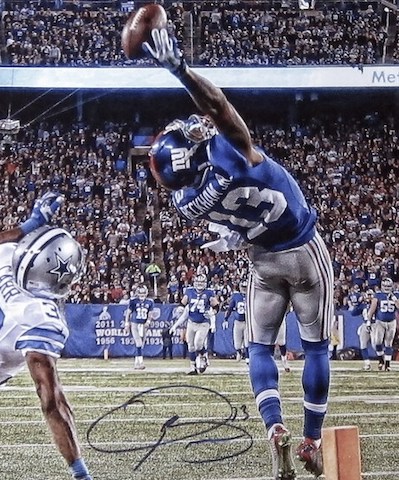
Tiki Barber RB 2004–06
Saquon Barkley RB 2018
Odell Beckham Jr. WR 2014–16 (right)
Brad Benson T 1986
James Bradberry CB 2020
Josh Brown K 2015
Jim Burt NT 1986
John Carney K 2008
Harry Carson LB 1978–79, 1981–87
Landon Collins DB 2016–18
Victor Cruz WR 2012
Zak DeOssie LB 2008 & 2010
David Diehl T 2009
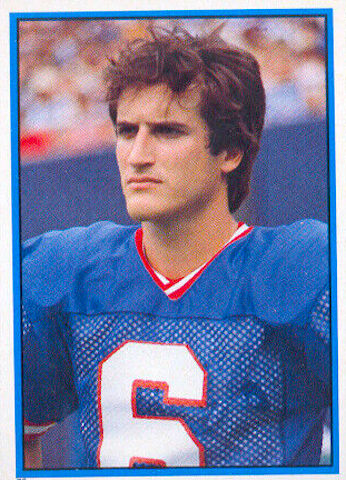
Jumbo Elliott T 1993
Evan Engram TE 2020
Jeff Feagles P 2008
Ali Haji-Sheikh K 1983 (right)
Rodney Hampton RB 1992–93
Dwayne Harris KR 2016
Mark Haynes DB 1982–84
Erik Howard DT 1990
Janoris Jenkins CB 2016
Dave Jennings P 1978–80 & 1982
Pepper Johnson LB 1990
Terry Kinard DB 1988
Sean Landeta P 1986 & 1990
Dexter Lawrence DE 2022
Eli Manning QB 2008, 2011–12 & 2015
Leonard Marshall DE-DT 1985–86
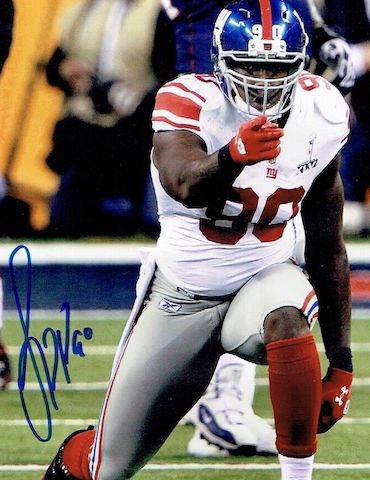
Dave Meggett RB 1989
Joe Morris RB 1985–86
Antonio Pierce LB 2006
Jason Pierre-Paul DE 2011–12 (right)
Dominique Rodgers-Cromartie DB 2015
Antrel Rolle DB 2010 & 2013
Aldrick Rosas K 2018
Jeremy Shockey TE 2002–03 & 2005–06
Phil Simms QB 1985 & 1993
Steve Smith WR 2009
Ron Stone C 2000–01
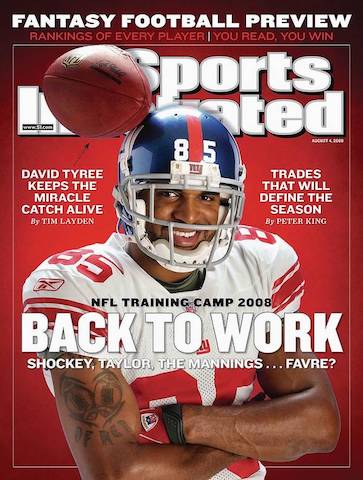
Michael Strahan DE 1997–99, 2001–03 & 2005
Lawrence Taylor LB 1981–1990
Michal Thomas DB 2018
Reyna Thompson DB 1990
David Tyree KR 2005 (right)
Justin Tuck DE 2008 & 2010
Osi Umenyiora DE 2005 & 2007
Brad Van Pelt LB 1976–80
Olivier Vernon DE 2018
FIRST-TEAM ALL-PRO (1976–Present)
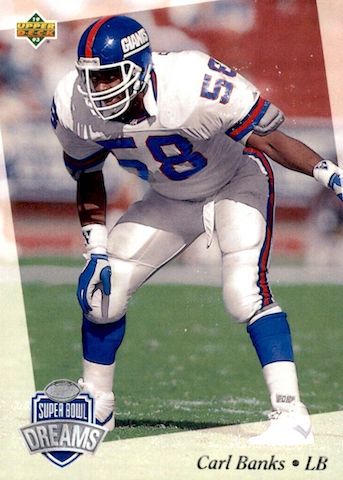
Jesse Armstead 1997
Carl Banks 1987 (right)
Tiki Barber 2005
Mark Bavaro 1986–87
Landon Collins 2016
Ali Haji-Sheikh 1983
Damon Harrison 2016
Mark Haynes 1982 & 1984
Dave Jennings 1980
Pepper Johnson 1990
Sean Landeta 1986 & 1989–90
Joe Morris 1986
Jason Pierre-Paul 2011
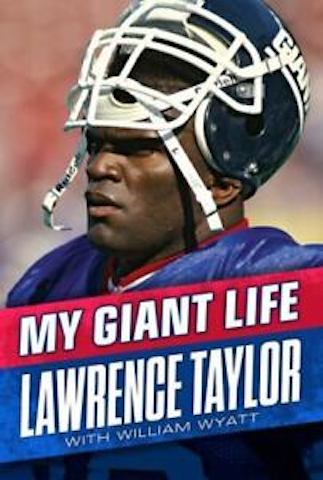
Jeremy Shockey 2002
Michael Strahan 1997–98, 2001, 2003,
Lawrence Taylor 1981–86 & 1988–89 (right)
Justin Tuck 2008
Osi Umenyiora 2005
Brad Van Pelt 1976–77